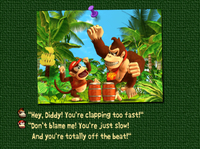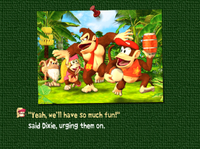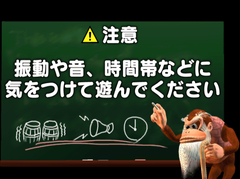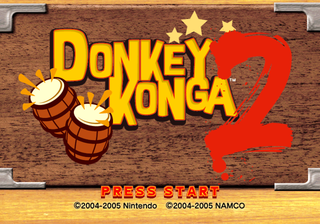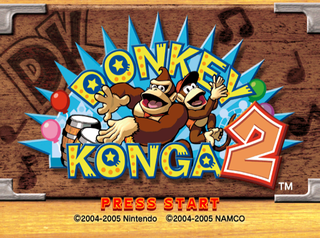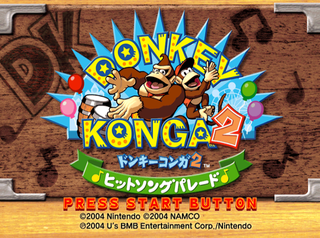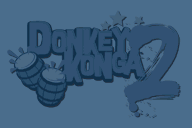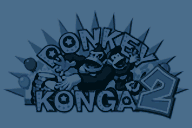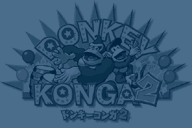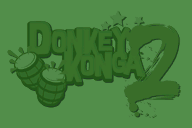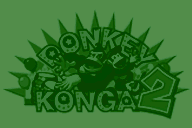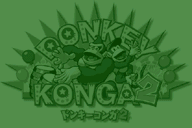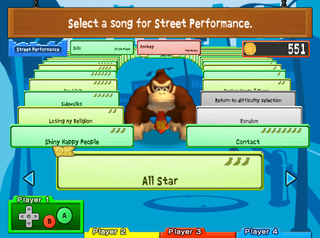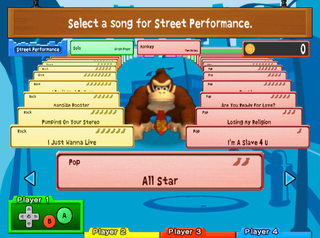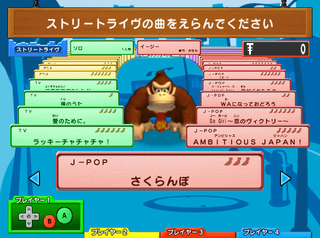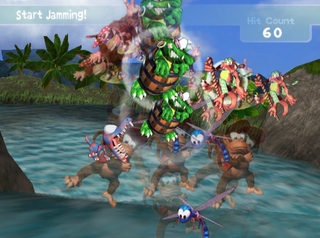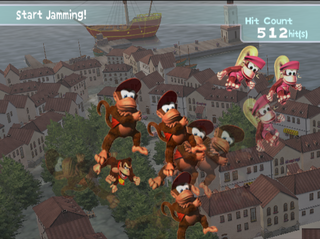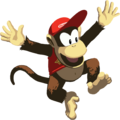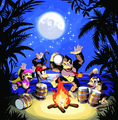Donkey Konga 2: Difference between revisions
m (Text replacement - "{{([Ss]erials|[Rr]elease)\|" to "{{flag list|") |
No edit summary |
||
| Line 10: | Line 10: | ||
|genre=[[Genre#Rhythm games|Rhythm]] | |genre=[[Genre#Rhythm games|Rhythm]] | ||
|modes=Single player, multiplayer | |modes=Single player, multiplayer | ||
|ratings={{ratings|esrb=T|pegi=3|cero=A}} | |ratings={{ratings|esrb=T|pegi=3|cero=A|usk=0}} | ||
|platforms=[[Nintendo GameCube]] | |platforms=[[Nintendo GameCube]] | ||
|format={{format|gcn=1}} | |format={{format|gcn=1}} | ||
Revision as of 00:47, October 10, 2024
| It has been requested that at least one audio and/or video file related to this article be uploaded. Please upload all related music, sound effects, voice clips, or any videos for this article. See the help page for information on how to get started. |
- This article is about the GameCube game. For the Flash game, see Donkey Konga 2 (Flash game).
| Donkey Konga 2 | |||||||||
|---|---|---|---|---|---|---|---|---|---|
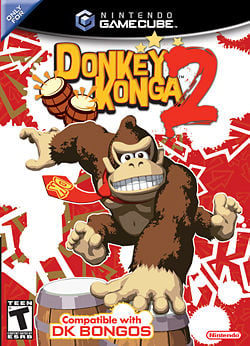 Cover art For alternate box art, see the game's gallery. | |||||||||
| Developer | Namco | ||||||||
| Publisher | Nintendo | ||||||||
| Platform(s) | Nintendo GameCube | ||||||||
| Release date | |||||||||
| Language(s) | English (United States) French (Canada) Spanish (Latin America) Japanese | ||||||||
| Genre | Rhythm | ||||||||
| Rating(s) |
| ||||||||
| Mode(s) | Single player, multiplayer | ||||||||
| Format | Nintendo GameCube:
| ||||||||
| Input | Nintendo GameCube:
| ||||||||
| Serial code(s) | |||||||||
Donkey Konga 2 is a Donkey Kong video game for the Nintendo GameCube. It is the sequel to Donkey Konga and the second title of the Donkey Konga series. A sequel to the game was released, Donkey Konga 3 JP, which had never been released internationally. Donkey Konga 2 was first released in 2004 and then received an international release in 2005. It is one of the few games in the Super Mario franchise that received a T rating from the ESRB.
Like the other Donkey Konga titles, Donkey Konga 2 utilizes the DK Bongos peripheral, but it retains its compatibility with the GameCube Controller.
Story
Donkey Kong and Diddy Kong were practicing the bongos; its energy was draining from the Kongs shouting and arguing with one another over their performance. Cranky and Dixie show up and hear them arguing. The Kongs blame each other to Cranky, but Dixie looks at Diddy's bongos and tells him and DK that she was listening to them and claims their bongo playing is "way off". Dixie is about to play the bongos, and DK and Diddy doubt her capability of playing them. To their surprise, Dixie was very good at playing the bongos. After drumming, Dixie told DK and Diddy to work on their drumming skills, specifically citing their timing and accuracy.
Cranky told DK and Diddy that they can only improve by competing against other people. He mentions of the whole world with music, and that the Kongs should tour off the island to practice on their bongos. Diddy expressed his love for the idea while Donkey Kong was unaware of the entire situation. He asked what the big deal was and if they would have a tour guide. DK and Diddy fantasize and excitedly shout in unison of all the Bananas they would be able to eat. Dixie decides to join the Kongs, and says that they cannot leave the island without her bongo skills. Diddy gets annoyed at her statement and professes to be good at playing bongos. The opening ends with the three Kongs leaving the island, and Cranky asks himself if they are prepared for a world tour, hoping they would "break a leg".
Gameplay
Donkey Konga 2 has largely similar gameplay to that of Donkey Konga's. It retains its Taiko no Tatsujin-based gameplay style. The player must hit the notes in conjunction with the song playing. A few unique modes appear in this game, including "Concert", "Freestyle Zone", and "Music Lab".
Aside from the story introduction, Dixie Kong has a role as a professional drummer. Sometimes, after completing a mode, Dixie provides advice to the player, known as "Dixie's Notes". Each bit of advice she provides is catalogued in the "Hall of Records" for the player to review. Dixie is also Donkey Kong's opponent in the Barrel Race mini-game.
Modes
| Image | Name | Description
|
|---|---|---|
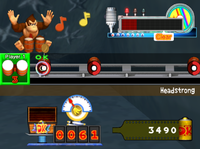 |
Street Performance 1-2 players |
In this mode, the player performs a song while hitting the corresponding musical notes to collect coins. Aside from some minor HUD differences, Street Performance has some differences from the predecessor. The coins are now stored in a DK emblem chest, a counter showing the number of coins, and a weight scale. Banana Fairys sometimes appear in the mode, and momentarily grant the ability for each note to have a value of three coins. Coins are used to purchase extra features in the Shopping Mall or to play mini-games in the Music Lab. |
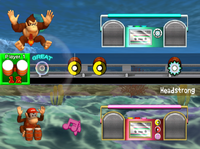 |
Concert 1-4 players |
In this mode, players synchronously perform a song, each with their own notes to hit. There is a Share Mode that allows multiplayer from a single DK Bongo Controller. Concert is also playable in single player, where the player (as Donkey Kong) rather performs with a computer player (as Dixie Kong). |
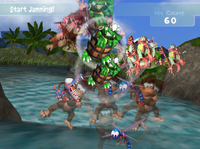 |
Freestyle Zone 1 player |
This mode freely allows the player to perform their own beats on the DK Bongos (or GameCube Controller), hence the name "freestyle". They can also press |
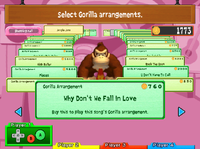 1 player |
Shopping Mall | This mode is the successor to DK Town from the first Donkey Konga. Shopping Mall allows the player to purchase unlockables if they have enough coins. There are two categories: "Jungle Jams" and "Bongos-A-Go-Go". The former option sells each song individually to be played on Gorilla (expert) difficulty level. The latter option sells different sound sets, which create different sound effects than the default bongos, and can be changed in each mode. |
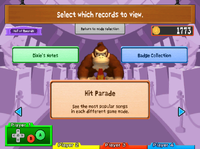 |
Hall of Records 1 player |
The player can review their achievements, which includes "Hit Parade", "Dixie's Notes", and "Badge Collection". The first option shows the highest score (in percentage) of notes that the player hit. The second option shows the advice already received from Dixie. Lastly, the third option shows a collection of badges earned by the player. |
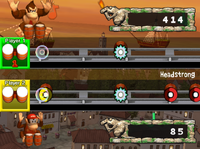 |
Battle 2-4 players |
In this mode, players perform a song to compete for the highest score. |
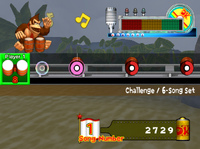 |
Challenge 1-2 players |
In Challenge mode, the player performs a number of songs in a row. There are three options: the "6-Song Set", "12-Song Set" and the unlockable "Full Set". |
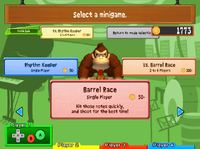 |
Music Lab 1-4 players |
This mode replaces the "Ape Arcade" section from Donkey Konga. In it, players can play one of two mini-games: Barrel Race or Rhythm Keeper. Unlike Donkey Konga, the player is required to pay coins for each play. It costs 50 coins to play either mini-game in single player, or 100 coins to play it in Vs. (multiplayer). |
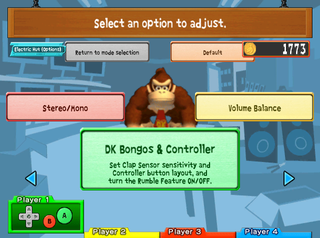 |
Electric Hut (Options) 1 player |
This is the options menu, which allows the player to change settings for their controller (either DK Bongos or GameCube), switch between Stereo and Mono, and a Volume Balance for adjusting the volume between sound effects and music. |
Shopping Mall unlockables
Bongos-A-Go-Go
Despite having the same function, each sound set is at a different price. Every sound set has three sound effects based on its title, and they each correspond with clapping and the left and right bongos. The following items are sold for the following amount of coins:
- Alarms Set: 2,900 coins
- Birds Set: 4,800 coins
- Boing Set: 3,200 coins
- Party Set: 2,600 coins
- Drums Set: 2,000 coins
- Fight Set: 5,800 coins
- Gigglebox Set: 4,500 coins
- Gong Set: 9,600 coins
- Horns Set: 7,700 coins
- Kittycat Set: 8,000 coins
- Office Set: 6,400 coins
- Safari Set: 6,800 coins
- Ding Set: 3,900 coins
- Sea Mammals Set: 5,200 coins
- Symphony Set: 8,000 coins
- Synth Set: 9,600 coins
Jungle Jams
Each song has a purchasable Gorilla Arrangement, which is peforming the song on expert difficulty. Like with Bongos-A-Go-Go, each item is individually priced even though the general purpose is the same. The following items are sold for the following amount of coins:
- U Don't Have to Call: 2,000 coins
- Rock the Boat: 3,200 coins
- Predictable: 1,500 coins
- The Anthem: 777 coins
- Drive: 1,600 coins
- Wish You Were Here: 750 coins
- Trouble: 1,800 coins
- Road Trip: 2,500 coins
- Sidewalks: 1,100 coins
- Losing My Religion: 2,000 coins
- Shiny Happy People: 1,000 coins
- All Star: 1,234 coins
- Contact: 2,222 coins
- Donkey Konga 2 Theme: 2,800 coins
- Trepak: 3,000 coins
- Habanera: 1,875 coins
- Minute Waltz: 1,949 coins
- La Bamba: 808 coins
- Boombastic: 480 coins
- No More Drama: 1,600 coins
- Come Clean: 980 coins
- Born Too Slow: 2,200 coins
- I Don't Want To Know: 1,500 coins
- Unpretty: 580 coins
- Hit 'Em Up Style (Oops!): 555 coins
- It's Been a While: 2,800 coins
- Send the Pain Below: 980 coins
- High Roller: 5,800 coins
- Pieces: 9,800 coins
- Headstrong: 3,200 coins
- Why Don't We Fall In Love: 760 coins
- Full Moon: 850 coins
List of songs
Like its predecessor, Donkey Konga 2 features a different set of songs per regional version.
- Japan
- Ai no Tame Ni - Aya Ueto (Aim for the Ace! TV drama ending)
- Ambitious Japan!
- Challenger!! - Rica Matsumoto (Pokémon Advanced Generation opening theme #2)
- Danzen! Futari wa Pretty Cure - Mayumi Gojo (Futari wa Pretty Cure opening theme)
- Donkey Kong A Go Go!! (theme for Donkey Konga 2)
- Doraemon no Uta - Kumiko Osugi (Doraemon (1979) opening theme)
- Dynamite
- Go Girl ~ Koi no Victory - Morning Musume
- Guantanamera
- Habanera from Carmen - Georges Bizet
- Hustle - Koichi Yamadera (Kaiketsu Zorori opening theme)
- Ko-inu no Waltz - Chopin
- The Legend of Zelda Theme
- Lucky Chachacha - Mini-Moni (Minimoni de Bremen Ongakutai opening theme)
- Mazinger Z - Ichiro Mizuki (Mazinger Z opening theme)
- Yeah! Me-cha Holiday - Aya Matsuura
- Monkey Magic (Monkey opening theme)
- Odoru Ponpokorin - B.B.Queens (Chibi Maruko-chan ending theme #1)
- Oshiete (Heidi, Girl of the Alps opening theme)
- Over Drive
- Realize - Nami Tamaki (Mobile Suit Gundam SEED opening theme #4)
- Sakuranbo - Ai Otsuka
- Secret Base ~ Kimi ga Kureta Mono
- Super Donkey Kong Theme
- Tane no Uta - Strawberry Flower (Pikmin 2 theme song)
- Tokusou Sentai Dekaranger - Psychic Lover (Tokusou Sentai Dekaranger opening theme)
- Trepak - Pyotr Ilyich Tchaikovsky
- Viva Rock - Orange Range (NARUTO ending theme #3)
- WA ni Natte Odorou
- Wild Challenger - Jindou (Bobobo-bo Bo-bobo opening theme)
- Yankee Doodle
- Zenbu Dakishimete
- North American
- All Star - Smash Mouth
- Boombastic - Shaggy
- Born Too Slow - The Crystal Method
- Come Clean - Hilary Duff
- Contact - Roger Sanchez
- Donkey Konga 2 Theme
- Drive - Incubus
- Full Moon - Brandy Norwood
- Habanera from Carmen - Georges Bizet
- Headstrong - Trapt
- High Roller - The Crystal Method
- Hit 'Em Up Style (Oops!) - Blu Cantrell
- I Don't Want To Know (If You Don't Want Me) - The Donnas
- It's Been Awhile - Staind
- La Bamba - Ritchie Valens
- Losing My Religion - R.E.M.
- Minute Waltz - Frédéric Chopin
- Na Na Hey Hey Kiss Him Goodbye - David Chester, Gary DeCarlo, Paul Leka, and Paul Plancon
- No More Drama - Mary J. Blige
- Pieces - Hoobastank
- Predictable - Good Charlotte
- Road Trip - Steriogram
- Rock the Boat - Aaliyah
- Send the Pain Below - Chevelle
- Shiny Happy People - R.E.M.
- Sidewalks - Story of the Year
- The Anthem - Good Charlotte
- Trepak - Pyotr Ilyich Tchaikovsky
- Trouble - Pink
- U Don't Have to Call - Usher
- Unpretty - TLC
- Why Don't We Fall in Love - Amerie
- Wish You Were Here - Incubus
- European/Australian
- All Star - Smash Mouth
- Are You Ready For Love? - Elton John
- Boombastic - Shaggy
- Breakfast at Tiffany's - Deep Blue Something
- Contact - Roger Sanchez
- Donkey Konga 2 Theme
- Don't Let Me Be Misunderstood - Santa Esmeralda
- Don't Let Me Get Me - P!nk
- Drive - Incubus
- Eine Kleine Nachtmusik
- Enjoy the Silence - Depeche Mode
- Green Greens
- Havanaise
- I'm A Slave 4 U - Britney Spears
- I Don't Want To Know (If You Don't Want Me) - The Donnas
- I Just Wanna Live - Good Charlotte
- Jungle Boogie - Kool & the Gang
- La Bamba - Ritchie Valens
- La Cucaracha
- Losing My Religion - R.E.M.
- Mansize Rooster - Supergrass
- Mute City Theme
- Na Na Hey Hey Kiss Him Goodbye - The Nylons
- Pokémon Main Theme
- Predictable - Good Charlotte
- Pumping on Your Stereo - Supergrass
- Runaway Train - Soul Asylum
- Shiny Happy People - R.E.M.
- Sidewalks - Story of the Year
- Super Mario Bros. 3 Theme
- That's the Way (I Like It) - KC and the Sunshine Band
- Trepak - Pyotr Ilyich Tchaikovsky
- Trouble - P!nk
- William Tell Overture - Gioachino Rossini
Regional differences
Like its predecessor, Donkey Konga 2 features regional differences aside from a different set of music. Aside from the language difference, the European and Japanese feature fewer differences than to the North American version.
The health & safety warning from Donkey Konga has been retained, but international releases replace them with regular health & safety warnings.
The title screen is different from the North American version to the European and Japanese versions. The Japanese version has a subtitle, so the main title was made smaller to accommodate room for the subtitle. Despite the logo difference, every regional version has the same Nintendo GameCube menu banner.
The background texture of Freestyle Zone's options menu and Dixie's Notes show the Donkey Konga 2 logo. As a result, each regional version shows their own logo. The Japanese logo is brighter than the European logo, which is even darker than the North American logo.
The song selection menu of the European and Japanese versions are sorted by genre. The North American version does not do this, and each of its banners are in either shade of green. However, the song list in the North American manual utilizes this categorization.[1]
In the Freestyle Zone, the number of hits is mentioned twice in the European version: the "Hit Count" (above) and the word "hit(s)" (on the right side).
Staff
- Hiroumi Endo
- Hiroshi Igarashi
- Hiroyuki Onoda
- Yoshihiro Kurohata
- Kenichiro Kubo
- Shigenori Kanai
References to other games
- Donkey Kong - The screen for creating a new Memory Card save shows sprites from the original Donkey Kong, and one of the default bongo options is NES, which features a few re-recorded sound effects from the game. These features also appear in the first and third Konga titles. Additionally, the background of the Challenge menu shows construction girders, reminiscent of 25m.
- Donkey Kong Country - The score dashboard of Battle mode has a banner based on the temple levels, with a Gnawty holding a torch.
- Donkey Kong Country 2: Diddy's Kong Quest - In both the Donkey Kong Country and Donkey Konga franchises, Dixie appears in the second installment but does not appear in the first game. In Freestyle Zone, most of the character artwork that displays on-screen originates from this game, which includes the Kongs, Animal Friends, and enemies.
- Donkey Kong Country 3: Dixie Kong's Double Trouble! - Artwork of a few Brothers Bear and a Banana Bird appear in Freestyle Zone. Kiddy Kong and Banana Bird are one of the selectable badges after the player makes a top score on performing a song. Swanky Kong and Wrinkly Kong's badges and Freestyle Zone artwork are from their appearance in Donkey Kong Country 3.
- Donkey Kong 64 - Banana Fairies reappear in the Street Performance mode, and a Banana Camera Film is the scoreboard banner in Street Performance and Challenge. In Freestyle Zone, a sound effect of either one of the five Kongs winning a Bonus Barrel mini-game plays after hitting a certain number of beats.
- Super Smash Bros. Melee - The track "Super Donkey Kong Theme" in the Japanese release and the tracks "Green Greens", "Mute City Theme", "Pokémon Main Theme", and "Super Mario Bros. 3 Theme" in the European release are from this game.
- Pokémon Advanced Generation - The track "Challenger!!" in the Japanese release is the second opening theme from this anime.
- Donkey Konga - The sequel to this game. The core gameplay and some modes (such as Street Performance) first appeared in this game.
- Pikmin 2 - The track "Tane no Uta" in the Japanese release is from a commercial for this game.
Gallery
- For this subject's image gallery, see Gallery:Donkey Konga 2.
Reception
Donkey Konga 2 received mixed to positive reviews from gaming outlets. Critics generally praised the responsive and intuitive mechanics and the multiplayer modes, but criticized the odd western track lists, the poor quality of many of the cover songs and the general lack of addition to the formula.
| Reviews | |||
|---|---|---|---|
| Release | Reviewer, Publication | Score | Comment |
| Nintendo GameCube | Tom Bramwell, Eurogamer | 5/10 | Donkey Konga 2 is an entertaining game...But it's not as good as lots of other rhythm-action and musical games that I've played. Here, the composition doesn't really need your input and as such you're drumming for points and exhibitionism, and while the former can make for a compelling game the absence of the latter is extremely significant. Elsewhere in the genre, the composition really needs you, points set you apart, and exhibitionism is the addiction that keeps you coming back. By comparison, Donkey Konga 2's a bit too... (ah hell, why not?) humdrum. |
| Nintendo GameCube | Juan Castro, IGN | 8/10 | In the end, the musical selections in Donkey Konga 2 will either seem like a good or terrible idea, depending on the person playing. As for this reviewer, the decision to toss videogame themes and classic oldies songs for a bunch of forgettable rock/pop and hip-hop tunes marks a bad move on the part of Nintendo. Yes, it's cool that Nintendo has tried to appeal to a mass audience, but it can't forget its fanbase either. It's all about compromise. Nintendo fans won't mind the inclusion of trendy tunes, so long as their music remains untouched. It would have nice to see other classic Nintendo tunes, in addition to the handful of numbers in the previous Konga game, not their systematic elimination. Still, the game remains a great multiplayer title. It's fun, simple and hopelessly addictive when playing with friends. So long as your friends don't hate hip-hop or Good, friggin', Charlotte. |
| Nintendo GameCube | Eduardo Vasconcellos, Gamespy | 3.5/5 | While the multiplayer features are really quite a bit of fun, that's about all the game is good for. The single-player modes are really lacking, which is really astounding since the multiplayer is so much fun. If you're going to be playing in single-player mode a lot, save yourself some drab gameplay, and for a little bit extra, buy yourself a starter three-piece drum set instead. You'll be free to play to your entire library of music and you'll be learning a new skill. |
| Aggregators | |||
| Compiler | Platform / Score | ||
| Metacritic | 69 | ||
| GameRankings | 71.38% | ||
Names in other languages
| Language | Name | Meaning | Notes |
|---|
References
External links
| Nintendo GameCube games | |
|---|---|
| Super Mario franchise | Luigi's Mansion (2001) • Super Mario Sunshine (2002) • Mario Party 4 (2002) • Mario Golf: Toadstool Tour (2003) • Mario Kart: Double Dash!! (2003) • Mario Party 5 (2003) • Paper Mario: The Thousand-Year Door (2004) • Mario Power Tennis (2004) • Mario Party 6 (2004) • Dance Dance Revolution: Mario Mix (2005) • Mario Superstar Baseball (2005) • Mario Party 7 (2005) • Super Mario Strikers (2005) |
| Donkey Kong franchise | Donkey Konga (2003) • Donkey Konga 2 (2004) • Donkey Kong Jungle Beat (2004) • Donkey Konga 3 JP (2005) |
| Wario franchise | Wario World (2003) • WarioWare, Inc.: Mega Party Game$! (2003) |
| Other | Super Mario 128 (2000, demo) • Super Smash Bros. Melee (2001) • Nintendo Puzzle Collection (2003) • NBA Street V3 (2005) • SSX on Tour (Nintendo Village) (2005) • Donkey Kong Racing (cancelled) • Diddy Kong Racing Adventure (cancelled) |
